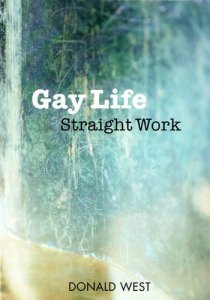
It is significant that Donald West prioritises the gay life over the straight work in the title of his 2012 autobiography: he covers the work, but the candid account of his gay life tends to put his professional accomplishments in the shade. He was born in Liverpool in 1924 and grew up in Crosby. His father worked for the Cunard shipping line and he had a lower-middle-class upbringing, but sadly his overprotective mother died when he was young, at which point his father married his mistress. Donald was socially withdrawn and suffered from feelings of inadequacy but was intellectually bright. Thanks to a helpful father (who popped up to lend financial support at various times) he was able to read medicine at the University of Liverpool, combining his studies with an interest in psychical research. He managed to avoid military service during the war and qualified as a doctor in 1947.
As a young man he attended Helen Duncan’s 1944 ‘witchcraft’ trial and had dinner with Harry Price, who died in 1948, but curiously he does not allude to either event in the book. He does mention that Price was annoyed when West showed arguments regarding a statistical issue Price had repeated were fallacious. A pause in his medical progress was a stint as research officer for the Society for Psychical Research (SPR), with a flat above the offices in London, and psychical research forms a thread running through his career. As research officer he was an enthusiastic experimenter, though he had reservations about spontaneous phenomena and mediumship.
He networked vigorously, anecdotes about some of the people he met providing sidelights on the history of the subject, but his scepticism led to complaints among some members and he was eased out of the post. Even so, he went on to build an illustrious reputation in the field. He was a long-standing SPR Council member (which is how I knew him), was president three times, and was by far the Society’s longest-serving member. He wrote a variety of books on the subject, from Psychical Research Today and Eleven Lourdes Miracles (slightly irritatingly not a round dozen), to his recent co-authored report Dr Soal: A Psychic Enigma which appeared as an issue of the SPR’s Proceedings, as well as numerous articles. It was a body of work that earned him the SPR’s prestigious Myers Memorial Medal.
Needing to earn a proper living, he became a psychiatrist. In 1955 he bravely produced a book looking at homosexuality when it was still illegal and secretive, arguing for a more tolerant attitude and for reform of the law. It was much of its time, and West later regretted having to write as if he was ‘one of us’ clinically examining ‘them’. While he was subsequently criticised for its timidity, a charge ignoring the mores of the period in which it was published, it helped to create an increasingly favourable climate of opinion towards what consenting adults did in private, leading to the sympathetic 1957 Wolfenden Report and decriminalisation a decade later.
In 1960 West moved to the Institute of Criminology at the University of Cambridge, where he was a member of an interdisciplinary team, and this is where he made his most significant scholarly contributions. However, he does not recollect the university establishment with great warmth. He lived in a rather nice cottage in Milton, just to the north of the city (where he once asked me to lunch to talk about testing psychic claimants) which gave him some distance. At the Institute, and in retirement, he worked on a range of topics such as juvenile delinquency, recidivism, murder-suicide, sex crimes, male prostitution and paedophilia. He was at various times a member of the Parole Board, a Mental Health Act Commissioner, and lent his services as a psychiatrist to a variety of causes, including as an expert witness. His humane approach to offending was always concerned for both the welfare of the individual and the good of society
The account of his gay life shows how attitudes shifted over the decades. Society has changed out of all recognition since the 1950s, and here he is able to talk unconstrainedly about the subject: perhaps sometimes with too much information, for example the surprising level of detail when describing how he caught venereal disease after unwise anal penetration. In the early days there was always a fear of being outed, which would have damaged his career, and for someone with much to lose he was remarkably promiscuous. He was lucky he managed to keep the lid on, and lucky to have had two long-term partners despite insisting on continuing his open lifestyle.
The Saturday Independent magazine used to have a section called something like ‘The expert’s expert’ in which people eminent in a particular field would cite those individuals they considered most influential. One instalment was devoted to criminologists, and I was pleased to see West listed as an acknowledged expert. He made solid contributions not only to criminology but also to gay studies and psychical research, reflecting the breadth of his interests. I knew Donald, who died in January 2020, for about thirty years, and while I was aware he was gay we never spoke about personal affairs, so it was startling to read in this frank memoir about the extent of his racy sex life. I cannot help thinking that if he had spent less time chasing the sex, and concentrated to a greater degree on his intellectual pursuits, he would have achieved even more of lasting value.
